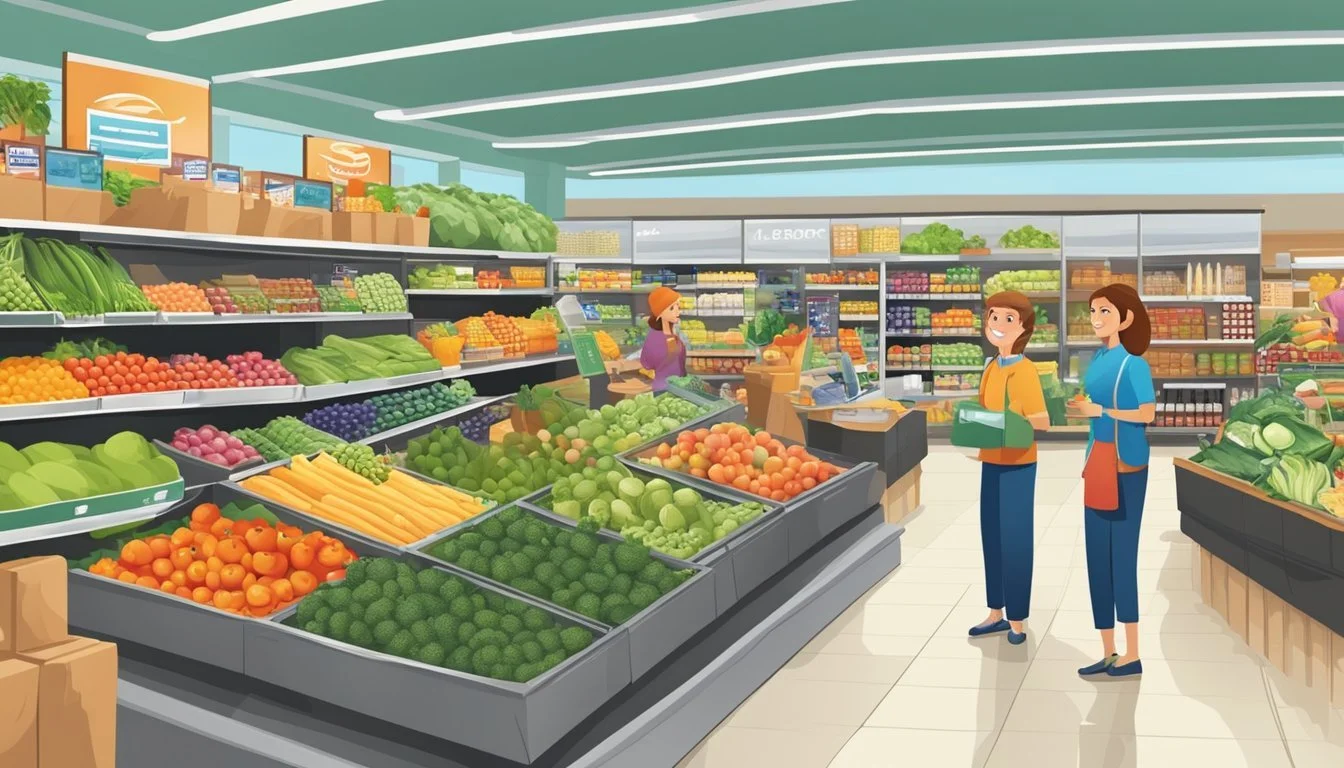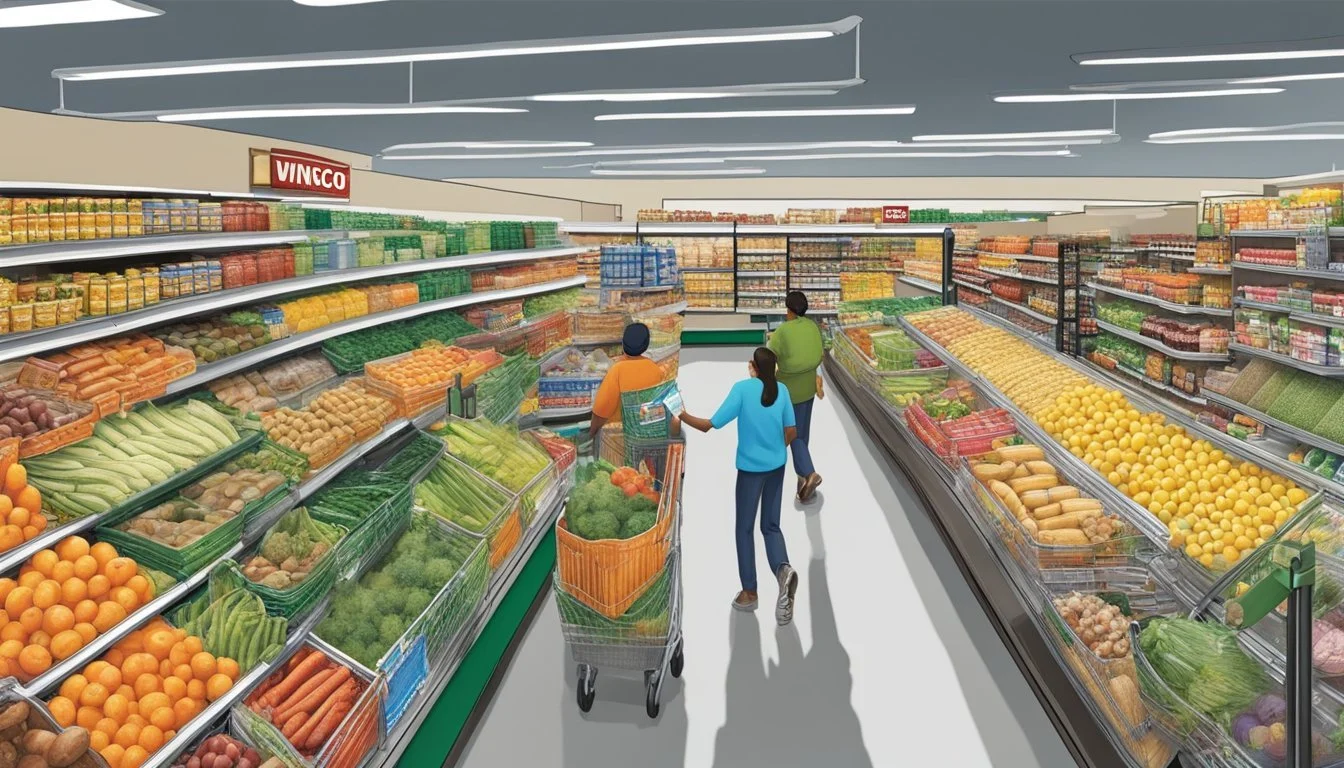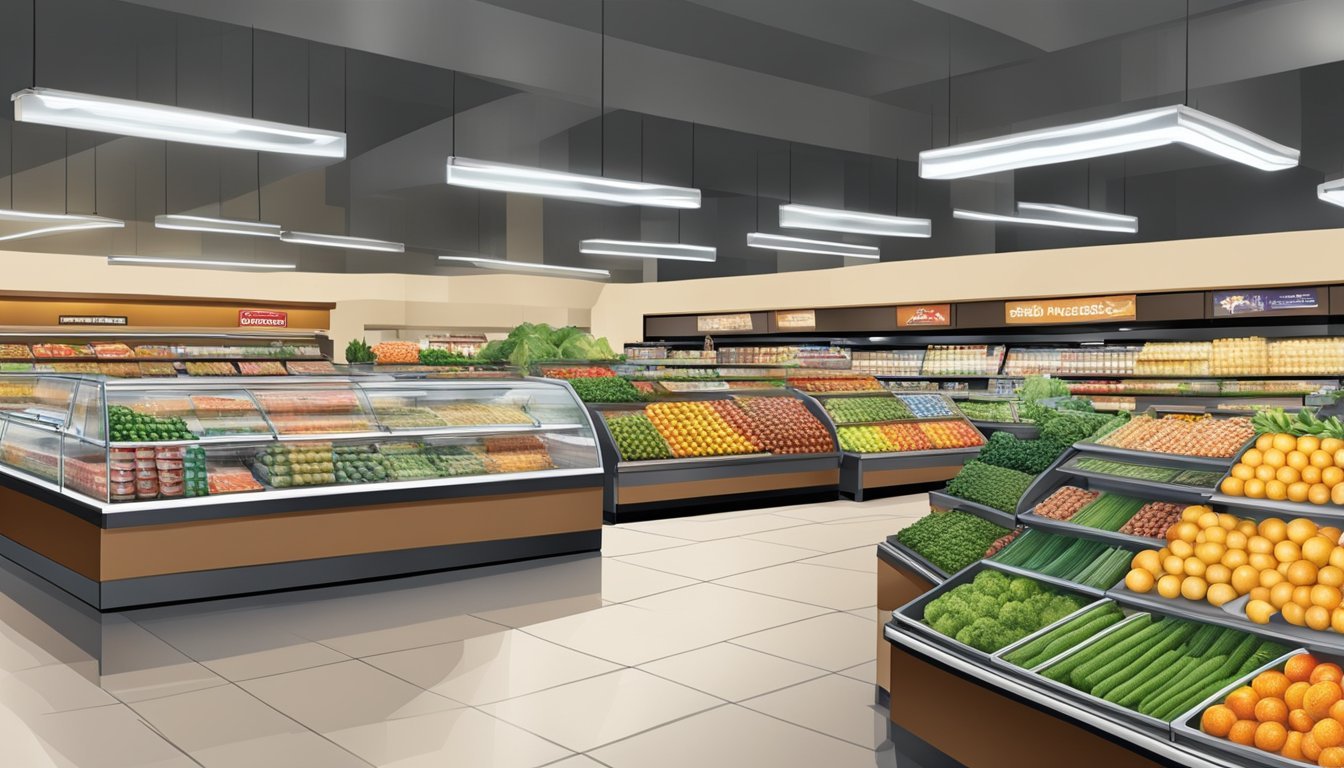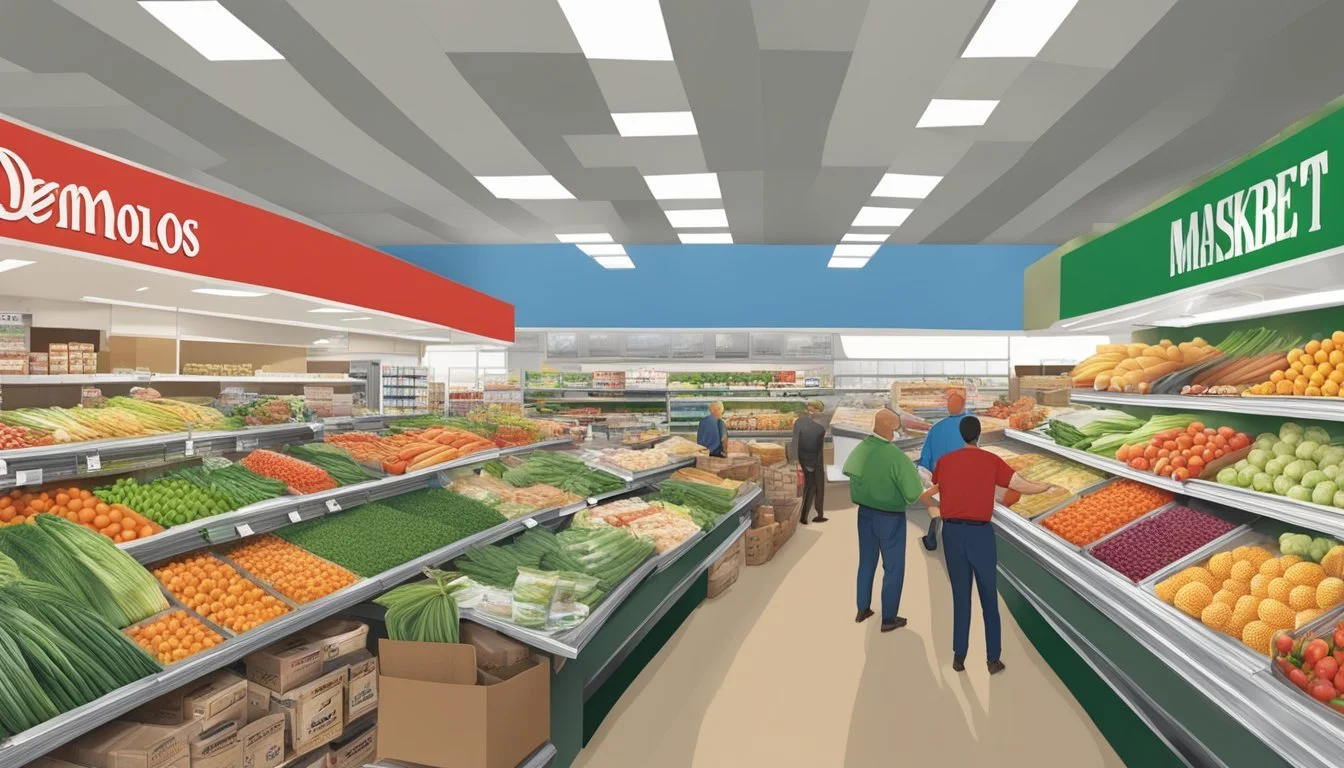Demoulas Market Basket vs WinCo Foods
Comparing Prices, Selection, and Customer Experience
Demoulas Market Basket and WinCo Foods stand out as two unique grocery chains in the United States. Both companies have built reputations for offering exceptional value to their customers through low prices and quality products.
Market Basket, a New England-based supermarket chain, has gained attention for its ability to maintain affordable prices even during periods of high inflation. A 2022 study by consumer data firm Dunnhuby ranked Market Basket as the top grocery store for affordability and quality among over 60 chains. The company's commitment to value extends beyond pricing, as it also offers generous pay and benefits to its workers.
WinCo Foods, primarily located in the western United States, operates as an employee-owned company known for its no-frills approach and bulk food options. Both grocers prioritize keeping costs low for shoppers, making them popular choices for budget-conscious consumers seeking quality products at competitive prices.
History and Background
Market Basket and WinCo Foods have unique histories rooted in family entrepreneurship and employee-focused business models. Both companies grew from humble beginnings to become significant players in the grocery industry.
Foundation and Growth
Market Basket traces its origins to 1917 when Greek immigrants Athanasios and Efrosini Demoulas opened a small grocery store in Lowell, Massachusetts. The store specialized in fresh lamb and catered to the local Greek community.
In 1954, brothers Telemachus and George Demoulas purchased the store from their parents for $15,000. They expanded the business rapidly, opening additional locations throughout New England.
WinCo Foods started as a discount warehouse grocery store called Waremart in 1967 in Boise, Idaho. The company adopted an employee-owned model early on, which became a cornerstone of its business philosophy.
Ownership and Leadership
Market Basket remained under Demoulas family ownership throughout its history. The company faced a significant leadership dispute in 2014 when Arthur T. Demoulas was ousted as CEO by his cousin Arthur S. Demoulas.
This led to widespread employee protests and customer boycotts. After weeks of turmoil, Arthur T. regained control of the company, solidifying his leadership and the company's employee-centric culture.
WinCo Foods transitioned to full employee ownership in 1985. This structure has allowed the company to provide competitive prices and benefits to both customers and employees.
Market Impact and Expansion
Market Basket has grown to 88 stores across Massachusetts, New Hampshire, Maine, and Rhode Island. The company is known for its low prices and loyal customer base in New England.
During the 2014 leadership crisis, Market Basket's impact on local communities became evident. Empty shelves and lost sales of $583 million demonstrated the chain's importance to both employees and customers.
WinCo Foods has expanded to over 130 stores in 10 states, primarily in the Western and Southwestern United States. The company's low-cost model and bulk food options have made it a strong competitor in the grocery market.
Business Model and Operations
Market Basket and WinCo Foods employ distinct strategies to deliver value to customers while maintaining profitability. Their approaches to supply chain management, cost control, and revenue generation shape their competitive positions in the grocery industry.
Supply Chain and Sourcing
Market Basket prioritizes local sourcing and long-term supplier relationships. The company works directly with regional farmers and producers to stock fresh, high-quality products. This approach reduces transportation costs and supports local economies.
WinCo Foods operates its own distribution centers and fleet of trucks. By cutting out middlemen, WinCo lowers costs and maintains greater control over its supply chain. The company buys in bulk and focuses on private label products to keep prices low.
Both chains emphasize efficient inventory management to minimize waste and maximize freshness. Market Basket's smaller footprint allows for more frequent deliveries, while WinCo's larger stores accommodate bigger shipments.
Cost Management Strategies
Market Basket keeps operating costs low through a no-frills approach. Stores have minimal decor and use basic shelving. The company avoids costly advertising campaigns, relying instead on word-of-mouth and customer loyalty.
WinCo employs a warehouse-style format to reduce overhead. Customers bag their own groceries, and the stores accept only debit cards or cash to avoid credit card fees. Both chains invest in energy-efficient lighting and refrigeration to cut utility costs.
Employee compensation differs between the two. Market Basket offers higher wages and a profit-sharing plan, viewing this as an investment in customer service and productivity. WinCo provides an employee stock ownership program, giving workers a stake in the company's success.
Revenue and Profit Margins
Market Basket generates strong sales volumes despite its limited store count. The chain's loyal customer base and competitive pricing drive consistent revenue growth. Profit margins are bolstered by efficient operations and strategic sourcing.
WinCo Foods operates on razor-thin margins, compensating with high sales volumes. The company's low-price strategy attracts budget-conscious shoppers and encourages bulk purchases. WinCo's employee ownership structure allows for longer-term financial planning and reinvestment in the business.
Both chains prioritize reinvesting profits into store improvements and expansion rather than paying dividends to external shareholders. This approach supports sustainable growth and helps maintain their competitive edge in pricing and operations.
Product and Service Offerings
Both Market Basket and WinCo Foods offer a wide range of products and services to meet customers' grocery needs. These stores prioritize fresh, quality items and diverse selections to cater to various preferences.
Fresh Produce and Meat Departments
Market Basket and WinCo Foods take pride in their fresh produce sections. Both chains source local and seasonal fruits and vegetables when possible. Market Basket is known for its competitive pricing on produce, often beating larger competitors.
The meat departments at both stores offer a variety of cuts and options. Market Basket's butchers provide custom cuts upon request. WinCo Foods features a self-serve meat counter, allowing customers to select their preferred quantities.
Both chains emphasize quality and freshness in their seafood sections. Market Basket often has a wider selection of fresh fish and shellfish, particularly in coastal locations.
Specialty and International Selections
Market Basket excels in offering an extensive range of international products, catering to diverse ethnic communities. Their stores typically feature dedicated aisles for Greek, Italian, and Latin American foods.
WinCo Foods provides a more limited but still varied selection of international items. Their bulk foods section is particularly popular, offering customers the ability to purchase exact quantities of spices, grains, and nuts.
Both chains stock a range of specialty diet products, including gluten-free, organic, and vegan options. Market Basket often has a larger selection in this category.
Additional Services and Departments
Market Basket and WinCo Foods offer full-service deli counters with prepared foods, sliced meats, and cheeses. Market Basket's delis often include hot food bars and made-to-order sandwiches.
Both chains have in-store bakeries producing fresh bread, cakes, and pastries daily. Market Basket typically offers a wider variety of artisanal breads and custom cake orders.
WinCo Foods stands out with its 24-hour operations in many locations, providing added convenience for shoppers. Market Basket, while not typically open 24/7, often has extended hours to accommodate various schedules.
Neither chain offers online ordering or delivery services, focusing instead on in-store experiences and keeping prices low.
Consumer Experience
Demoulas Market Basket and WinCo Foods prioritize customer satisfaction through competitive pricing, attentive service, and value-driven offerings. Both chains have cultivated loyal followings in their respective regions.
Pricing and Affordability
Market Basket and WinCo Foods are renowned for their low prices. Market Basket consistently ranks high in affordability studies, topping Dunnhuby's 2022 survey of over 60 grocery chains. WinCo's employee-owned model allows for significant cost savings passed on to customers.
Both stores utilize a no-frills approach to keep prices down. Customers bring their own bags and often bag their own groceries. WinCo's bulk bin section offers additional savings on pantry staples.
Market Basket's "More for Your Dollar" slogan reflects its commitment to value. WinCo's warehouse-style stores and limited brand selection contribute to its ability to offer rock-bottom prices.
Customer Service and Satisfaction
Market Basket is known for its friendly, attentive staff. Employees often develop long-term relationships with regular customers, creating a community atmosphere. The chain's commitment to customer service was highlighted during a 2014 employee walkout, where customers boycotted in solidarity.
WinCo's employee-ownership model incentivizes workers to provide quality service. Staff members are often knowledgeable about products and store operations. Both chains prioritize keeping shelves well-stocked and maintaining clean store environments.
Wait times at checkout can vary, with Market Basket sometimes experiencing longer lines due to its popularity. WinCo's 24-hour operations in many locations offer added convenience for customers.
Brand Loyalty Programs
Market Basket does not offer a traditional loyalty program. Instead, it focuses on consistently low prices for all customers. This approach aligns with its reputation for fairness and value.
WinCo Foods similarly lacks a formal loyalty program. The chain emphasizes everyday low prices rather than temporary discounts or point-based rewards. This strategy resonates with budget-conscious shoppers seeking consistent value.
Both stores cultivate customer loyalty through their pricing strategies and shopping experiences rather than structured rewards programs. Regular shoppers often develop strong brand allegiance based on overall value and satisfaction.
Cultural and Community Impact
Market Basket and WinCo Foods have both left significant marks on their local communities. These grocery chains have become integral parts of the regions they serve, influencing economic landscapes and social dynamics.
Role in Local Economies
Market Basket, founded by Greek immigrants, has deep roots in New England. The chain employs 25,000 people across 71 stores and 3 warehouses in two states. It offers affordable prices, potentially saving low and moderate-income families up to $4,000 annually on groceries. This cost-saving aspect directly impacts household budgets and local spending power.
WinCo Foods, while less regionally concentrated, also plays a crucial economic role. As an employee-owned company, it provides workers with a stake in the business. This model fosters job stability and employee loyalty, contributing to stronger local economies where WinCo operates.
Community Engagement and Support
Market Basket's community ties were dramatically highlighted during a 2014 employee strike and customer boycott. Workers and shoppers united to protest the firing of CEO Arthur T. Demoulas, demonstrating the chain's importance beyond mere retail. This event showcased Market Basket's unique position as a family-owned business deeply connected to its community.
WinCo Foods engages differently, focusing on low prices and efficient operations. It supports local food banks and participates in community events. Both chains prioritize hiring from within their communities, creating career paths for local residents. Their presence in areas like Rhode Island helps maintain access to affordable groceries in diverse neighborhoods.
Challenges and Controversies
Both Demoulas Market Basket and WinCo Foods have faced significant challenges and controversies over the years. These issues have tested their organizational resilience and impacted their market positions.
Internal Conflicts and Disputes
Market Basket's history is marked by a bitter family feud. In 2014, Arthur S. Demoulas led a board vote to oust his cousin, Arthur T. Demoulas, as CEO. This decision sparked a massive employee strike and customer boycott, nearly crippling the company.
The dispute centered on differing visions for the company's future. Arthur S. favored increasing profit margins, while Arthur T. prioritized employee benefits and low prices. The conflict culminated in a six-week standoff that garnered national attention.
WinCo Foods, while employee-owned, has faced its own internal challenges. The company's rapid expansion has sometimes led to tensions between long-time employees and new management brought in to oversee growth.
Competitive Pressures and Market Position
Both chains operate in highly competitive markets. Market Basket faces pressure from larger national chains and discount stores in New England. Its low-price strategy, while popular with customers, sometimes strains profitability.
WinCo competes with giants like Walmart and Costco in the western United States. Its employee-ownership model can make raising capital for expansion more challenging than traditional corporate structures.
Both companies have had to innovate to maintain their market positions. Market Basket has focused on improving store layouts and expanding its product range. WinCo has invested in bulk food sections and efficient distribution systems.
Legal and Ethical Issues
Market Basket's family feud spilled into the legal arena. Arthur S. Demoulas filed lawsuits against Arthur T., alleging he had defrauded the company. These legal battles drained resources and damaged the company's reputation.
The 2014 dispute also raised ethical questions about corporate governance and the rights of non-family shareholders. The Rafaela Evans trust, a key shareholder, played a crucial role in the board's decisions.
WinCo has faced its own legal challenges, primarily related to labor practices. As an employee-owned company, it has had to navigate complex regulations governing employee stock ownership plans (ESOPs).
Both companies have worked to address these issues and strengthen their ethical standards in recent years.
Technological Integration and Innovations
Demoulas Market Basket and WinCo Foods have embraced technology to varying degrees in their operations. Both chains aim to enhance customer experience and operational efficiency through strategic tech investments.
Adoption of New Retail Technologies
Market Basket has taken a measured approach to technology adoption. The chain focuses on maintaining its traditional shopping experience while selectively implementing modern tools. Self-checkout lanes have been introduced in some locations to reduce wait times.
WinCo Foods has been more aggressive in adopting new retail technologies. The company has rolled out smart shopping carts in select stores, equipped with screens to display product information and running totals. WinCo also utilizes advanced inventory management systems to optimize stock levels and reduce waste.
Both chains have implemented digital price tags in some locations, allowing for quick and accurate price updates across their stores.
Online Presence and E-Commerce Strategies
Market Basket's online presence is relatively limited. The company maintains a basic website with store locations, weekly circulars, and company information. E-commerce options are not widely available for Market Basket customers.
WinCo Foods has developed a more robust online strategy. The chain offers an e-commerce platform in select markets, allowing customers to order groceries for pickup or delivery. WinCo's mobile app provides digital coupons, shopping lists, and store locator features.
Neither chain has partnered with third-party delivery services like Instacart, preferring to maintain control over their customer interactions and pricing.
Future Opportunities in Retail Technology
Both Market Basket and WinCo Foods have opportunities to further integrate technology into their operations. Potential areas for growth include:
Implementing AI-powered demand forecasting systems
Expanding mobile app functionality with personalized offers
Exploring cashierless checkout options similar to Amazon Go stores
Investing in automated warehouse solutions for more efficient distribution
As competition from tech-savvy retailers like Amazon-owned Whole Foods intensifies, both chains may need to accelerate their technological adoption to remain competitive in the evolving grocery landscape.
Comparative Analysis
Market Basket and WinCo Foods both offer competitive pricing and unique shopping experiences. Their approaches to value, service, and target markets differ in key ways.
Price Comparison and Value Proposition
Market Basket consistently ranks as one of the most affordable grocery chains in the U.S. Their "More For Your Dollar" slogan rings true with consistently low prices across departments. WinCo Foods matches this commitment to value, operating as an employee-owned company that passes savings directly to customers.
Both stores prioritize keeping costs down through efficient operations. Market Basket often features "price lock" promotions on staple items. WinCo's bulk foods section allows shoppers to buy exactly what they need at lower per-unit costs.
Neither chain accepts credit cards, helping reduce processing fees that could drive up prices. Instead, they focus on cash, debit, and EBT transactions to maintain their low-price models.
Service and Store Policies
Market Basket is known for its attentive customer service and well-staffed stores. Employees often assist with bagging groceries and carrying items to cars. Their "no questions asked" return policy builds customer trust.
WinCo takes a more hands-off approach, focusing on efficiency. Customers bag their own groceries, but checkout lines move quickly. The store's 24-hour operations in many locations offer flexibility for shoppers.
Both chains limit their advertising budgets, instead relying on word-of-mouth and repeat customers. This strategy allows them to allocate more resources to keeping prices low and maintaining store quality.
Customer Demographics and Target Markets
Market Basket has a strong presence in New England, catering to a loyal, multi-generational customer base. Their wide product selection appeals to families and shoppers seeking both value and variety.
WinCo Foods targets budget-conscious consumers in the Western and Southern United States. Their no-frills approach and bulk options attract large families, students, and anyone looking to stretch their grocery budget.
Both stores have found success by focusing on specific regional markets rather than attempting nationwide expansion. This strategy allows them to tailor their offerings to local preferences and maintain strong community connections.
Market Position and Future Outlook
Demoulas Market Basket and WinCo Foods have established strong regional footprints. Both chains face challenges and opportunities in a rapidly evolving grocery landscape.
Current Market Trends and Consumer Behaviors
Market Basket holds the top market share in Boston, Manchester, and Concord metro areas. The chain's popularity stems from its ability to offer low prices while maintaining quality. WinCo Foods has a strong presence in the western United States, known for its employee ownership model and bulk food options.
Consumer demand for affordability has intensified due to inflation. Both chains are well-positioned to meet this need. Market Basket was ranked as the best grocery store for handling inflation in a 2022 study by Dunnhuby.
Shoppers increasingly seek convenience and digital options. WinCo has expanded its online ordering and curbside pickup services. Market Basket has been slower to adopt e-commerce but maintains a loyal customer base.
Potential Growth and Expansion Plans
Market Basket operates primarily in Massachusetts and New Hampshire. The chain has shown steady growth, recently opening its largest store at 135,000 square feet in Chelsea, Massachusetts. This expansion indicates potential for larger format stores in urban areas.
WinCo Foods has been expanding into new markets like Texas and Louisiana. The company's low-cost model and employee ownership structure make it an attractive option for price-conscious consumers in these regions.
Both chains face competition from larger national players like Walmart and Whole Foods. Their expansion strategies will likely focus on strengthening regional dominance and gradually entering adjacent markets.
Long-Term Sustainability and Industry Predictions
The grocery industry is experiencing consolidation and increased competition from non-traditional players. Market Basket and WinCo Foods' focus on low prices and operational efficiency positions them well for long-term success.
Market Basket's strong community ties and customer loyalty provide a buffer against market fluctuations. The chain's ability to maintain low prices during inflationary periods demonstrates its resilience.
WinCo's employee ownership model contributes to high employee satisfaction and low turnover. This structure may prove advantageous in a tight labor market.
Both chains will need to invest in technology and e-commerce to remain competitive. Balancing these investments with their low-price strategies will be crucial for future growth and sustainability.








